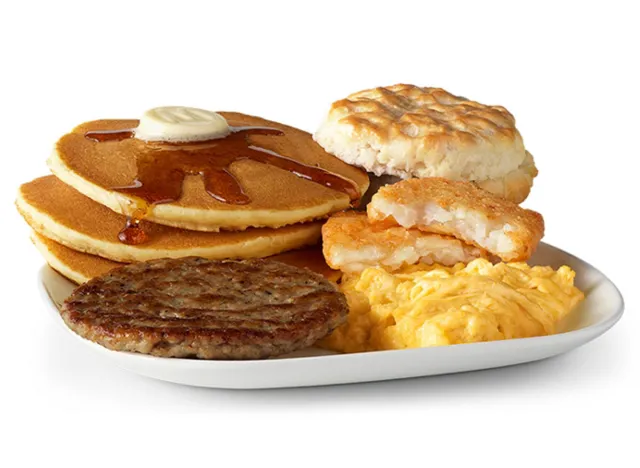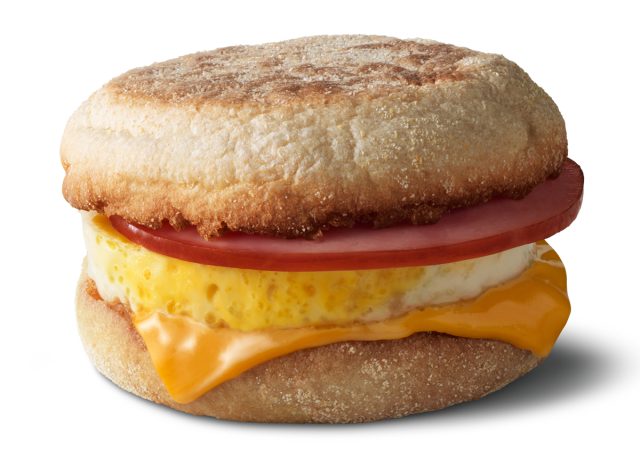The #1 Unhealthiest McDonald's Order (and What To Eat Instead)

Sometimes, stopping at a fast-food drive-thru is the only option for a meal, and other times, you just want some of the best french fries around. Arguably, McDonald's is top of the list for both scenarios, and even though I'm a Dietitian, I've stopped at the golden arches to satisfy my hunger.
McDonald's offers a mix of extremely unhealthy and relatively "healthy" choices on their menu, but no matter how hungry I am, there's one item on the McDonald's menu I'll never order—and it's not the Big Mac.
Below, I'm sharing the number one unhealthiest order at McDonald's. Don't stop there, because I've got a surprisingly healthier suggestion to eat instead. Read on, then check out The McDonald's Menu—Ranked by Nutrition.
The Unhealthiest McDonald's Order Is… The Big Breakfast with Hotcakes

Calories: 1340
Fat: 63 g (Saturated Fat: 24 g)
Sodium: 2070 mg
Carbs: 158 g (Fiber: 5 g, Sugar: 48 g)
Protein: 36 g
This order is for you if you ever wanted a taste of just about everything on McDonald's breakfast menu. The Big Breakfast with Hotcakes is stacked high with scrambled eggs, breakfast sausage, hash browns, a flakey biscuit, and pancakes smothered in butter and maple syrup. Coming in at 1,340 calories per serving, it's more like two or three meals rather than one. For a 2000-calorie diet, that's more than half of your daily calories consumed just at breakfast. That means you'll have to skimp out later in the day just to avoid overeating.
What's just as staggering as the calories in the Big Breakfast with Hotcakes is the 63 grams of total fat and 24 grams of saturated fat (likely from the sausage, eggs, and butter). That's 122% of the daily recommended value for saturated fat.
Research suggests that a diet rich in saturated fat may increase your risk of cardiovascular disease, and the Dietary Guidelines for Americans suggest that less than 10% of your daily calories come from saturated fat—or only about 10 grams per day—making it clear that this meal far exceeds these guidelines.
Let's not forget about this meal's sodium content. Like saturated fat, it turns out too much sodium isn't good for your heart either. Since the FDA recommends keeping your sodium intake below 2,300 milligrams per day, the Big Breakfast with Hotcakes (containing 2,070 milligrams of sodium per serving) will have to be your only meal to stay within those guidelines.
While this enormous breakfast has 5 grams of fiber, it's surely not coming from fruits or vegetables—both of which provide essential vitamins, minerals, and antioxidants. At 36 grams of protein, this nutrient is just about the only good thing (aside from a small amount of fiber) this meal has going for it.
A Healthier Option Is… The Egg McMuffin

Calories: 310
Fat: 13 g (Saturated Fat: 6 g)
Sodium: 770 mg
Carbs: 30 g (Fiber: 2 g, Sugar: 0 g)
Protein: 17 g
If it boils down to no breakfast or stopping at a drive-thru, the latter is always better, especially if you choose an order like the Egg McMuffin. One Egg McMuffin has 310 calories, 13 grams of fat, 30 grams of carbs, and 17 grams of protein. Though the total fat could be a bit lower overall, the fact that there are only 6 grams of saturated fat means the remaining 7 grams of fat are coming from healthy poly- and mono-unsaturated fatty acids. Healthy dietary fats are important for vitamin absorption, heart health, and to prevent metabolic disease.
What I really like about the Egg McMuffin, aside from its buttered toasted English Muffin, is the 17 grams of protein. Though the Big Breakfast with Hotcakes has almost two times this number, the serving found here is sufficient for a meal and will help keep you full and satisfied until your next.
The only nutrient that could use some work is fiber. While there are 2 grams of fiber per serving, it's nothing compared to the 5 grams in the Hotcakes. In fact, the Big Breakfast with Hotcakes has more fiber than any other item on the McDonald's menu. Do not worry—two grams of fiber is better than none and will help you edge toward your daily fiber needs. The dietary reference intake (DRI) for fiber is set at 25-38 grams of fiber per day to maintain a healthy gut and healthy body weight and reduce the risk of chronic disease. Aim for around 5-8 grams of fiber per meal and snack to meet this goal.
If you want to make this swap even more nutritious, the next time you hit the McDonald's drive-thru for breakfast, order the Egg McMuffin with a McCafe Cappuccino or Latte for an extra 8-10 grams of protein and no added sugar.
- Source: https://pubmed.ncbi.nlm.nih.gov/34649831/
- Source: https://www.dietaryguidelines.gov/sites/default/files/2020-12/Dietary_Guidelines_for_Americans_2020-2025.pdf
- Source: https://www.ncbi.nlm.nih.gov/pmc/articles/PMC9832237/#:~:text=The%20sodium%20intake%20recommended%20by,h%20to%20prevent%20chronic%20disease.&text=1-,There%20is%20clear%20evidence%20that%20high%20sodium%20intake%20is%20associated,CVDs)%20and%20other%20chronic%20diseases.
- Source: https://www.fda.gov/food/nutrition-education-resources-materials/sodium-your-diet#:~:text=However%2C%20the%20Dietary%20Guidelines%20for,1%20teaspoon%20of%20table%20salt!
- Source: https://www.ncbi.nlm.nih.gov/pmc/articles/PMC9083822/
- Source: https://www.ncbi.nlm.nih.gov/books/NBK559033/









